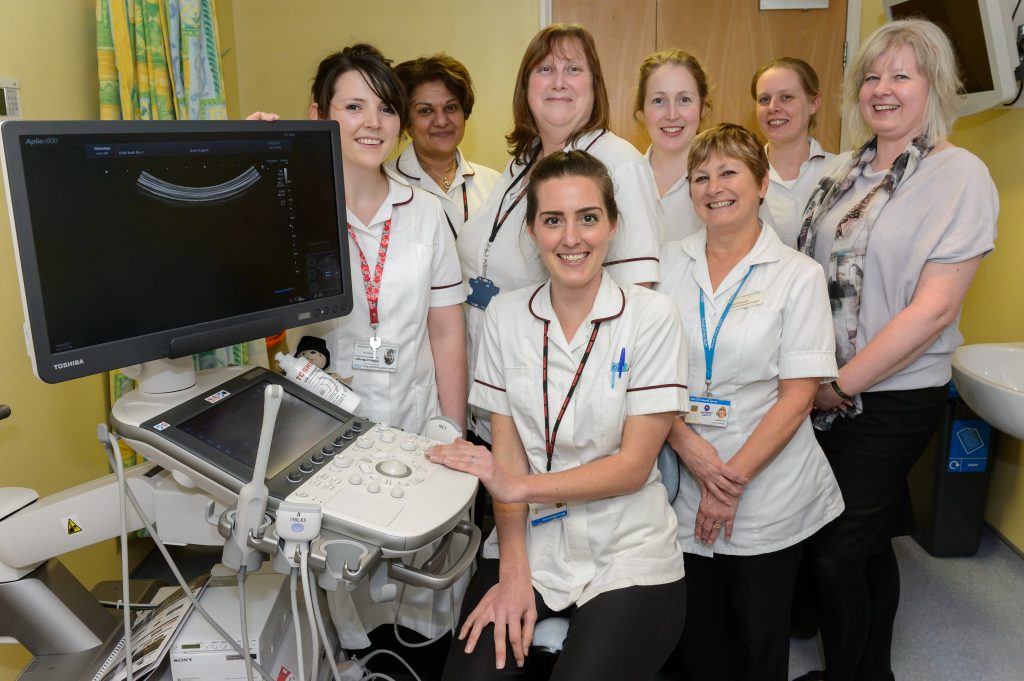
Royal United Hospitals Bath recently purchased two of Canon Medical’s latest Aplio i-800 ultrasound systems for use in obstetrics, gynaecology, abdominal and MSK applications. The new scanners replace existing Canon Medical equipment, so that users are now able to enjoy state-of-the-art technologies such as such Superb Micro-vascular Imaging (SMI), and ultra wide-band i-series transducers.
Key features of the new equipment appreciated by the hospital include the SMI technology, and the multiple frequency probe design, which encompasses the traditional 6 and 3.75 MHz curved array probe in one unit. This innovation saves on cost and promotes efficiency of use since the need for switching between probes during an exam is negated. In addition, the design of the probe is larger than the usual 6 MHz version and is therefore more ergonomic, preventing RSI.
Tracey Blacker, Team Leader comments, “In the past our department has always chosen Canon Medical ultrasound equipment, which means that the products have a familiarity, which aids in training and also reduces the need for extensive applications support, an inevitable cause of reduction in throughput.” Productivity is always important in a busy acute hospital setting, and as well as saving time, having the same equipment also assists in probe connectivity -(for several years the department had one linear probe shared between five machines, a major cost saving”. Tracey continues, Canon is very innovative with numerous training days up and down the country and the applications support and aftercare/service are excellent, so that we are able to get the most out of our equipment”.
SMI offers colour flow imaging with unmatched detail and definition. It expands the range of visible blood flow to visualise low-velocity micro-vascular flow as never seen before with diagnosis ultrasound.
Aplio i-series ultra-wideband transducers cover the same bandwidth as two conventional transducers, providing superior sensitivity and resolution for both the near and far field. As well as helping to reduce cost, this revolutionary transducer design can also provide better imaging regardless of the patient condition
The new series features new beam-forming technology, iBeam, which optimises the efficiency of the beam, increasing penetration, spatial resolution and contrast resolution, while at the same time, reducing artefacts and clutter. It also comes with intelligent Dynamic Micro-Slice (iDS), which increases clinical accuracy and reveals more detail in all depths by electronically sharpening the imaging slice thickness.
Intuitive ergonomics boost productivity during daily routine and complex exams with iSense, which offers an image-guided user interface to visually guide the physician through the exam, simplifying system operation and helping improve efficiency. In addition, to make the ultrasound exams faster, the system features touch control screens and real-time quick scan, which makes automatic image adjustments without pushing a button.
Photo:
Shown here (left to right) Becca Morgan and Rita Phillips, Advanced Practitioner Sonographers; Tracey Blacker, Team Lead; Elena Williams and Sue Jones, Advanced Practitioner Sonographers; Helen Lockyer, Applications Specialist, Canon Medical Systems. In front on the left is Catherine Elmes, Trainee Sonographer and on the right, Jane Rosevear, Ultrasound Department Assistant
Canon Medical Systems has a carbon-zero project in place. We have calculated the carbon footprint for each of our products to include manufacturing, shipping, delivery and average hospital energy used for the standard lifetime of the equipment as follows:
Ultrasound equates to 1 stove and 3,415 litres of water